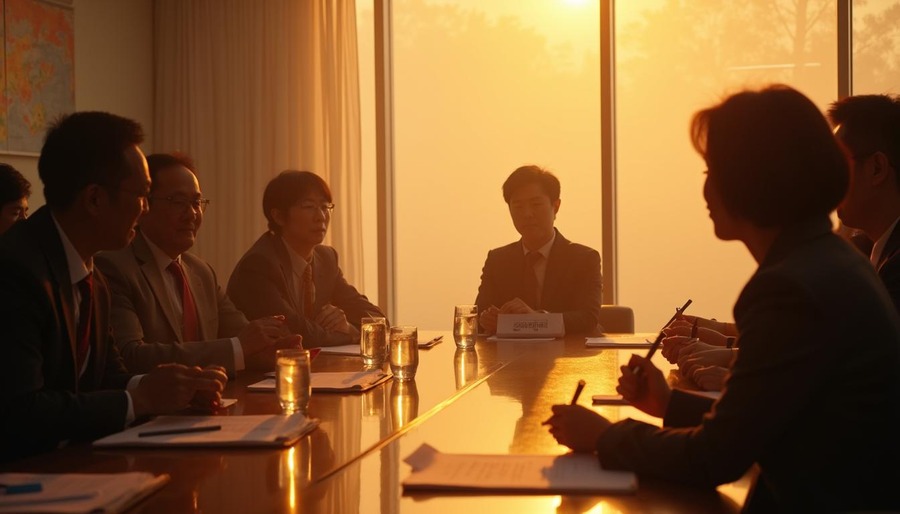Thursday, July 10, 2025
As part of its first post-pandemic tourism revival initiative, South Korea and the ASEAN states like Thailand, Singapore, Malaysia, Indonesia and Vietnam gathered for the first strategic roundtable conference in Da Nang, Vietnam. The conference mapped concrete action plans and concerted efforts to accelerate tourism revival, regional connectivity, and sustainable tourism developments.
Collaborative Tourism Recovery: A United Approach
The ASEAN-South Korea roundtable represents a unified commitment to revitalizing the tourism industry, severely impacted by recent global disruptions. Delegates exchanged insights and strategies, emphasizing coordinated efforts to restore traveler confidence, rebuild tourism infrastructure, and stimulate international travel demand.
This collaborative approach underscores the importance of regional and international partnerships in achieving effective tourism recovery and growth.
Strategic Connectivity: Enhancing Regional and International Travel
A key focus at the Da Nang roundtable was enhancing connectivity between ASEAN nations and South Korea. Discussions included increasing flight frequencies, introducing new air routes, and simplifying travel procedures to facilitate smoother travel experiences.
Improved connectivity is pivotal in attracting more tourists, boosting economic interactions, and strengthening diplomatic ties within the region and beyond.
Economic Revival: Stimulating Local and Regional Economies
Tourism is a critical economic driver for ASEAN countries and South Korea. Participants at the roundtable highlighted the potential economic benefits of a coordinated recovery strategy, including job creation, local business growth, and increased foreign investment.
Efficient tourism recovery plans promise substantial economic stimulation, fostering overall economic resilience and prosperity across participating nations.
Sustainability Commitment: Promoting Responsible Tourism Practices
Sustainable tourism was a core theme throughout the discussions. Representatives emphasized the importance of incorporating sustainable and eco-friendly practices into tourism recovery strategies, such as responsible resource management, conservation initiatives, and community engagement.
Prioritizing sustainability ensures the long-term viability of tourism industries, preserves natural and cultural heritage, and appeals to environmentally conscious travelers.
Enhanced Visitor Experiences: Emphasizing Safety and Quality
To boost traveler confidence, the roundtable underscored the importance of enhancing visitor safety and overall travel experiences. Initiatives discussed included implementing rigorous health and safety protocols, improving tourism infrastructure, and delivering high-quality hospitality services.
Focusing on safety and quality significantly enhances visitor satisfaction and promotes repeat visitation.
Technological Innovation: Digitalizing Tourism Services
Leveraging advanced technologies, ASEAN and South Korea aim to streamline tourism recovery through digital innovation. Discussions emphasized adopting digital tools for efficient traveler management, virtual tourism experiences, online booking platforms, and contactless solutions.
Technological integration plays a crucial role in modernizing tourism industries, enhancing operational efficiency, and meeting contemporary traveler expectations.
Cultural Promotion: Showcasing Regional Diversity
Participants also recognized the importance of cultural promotion in tourism recovery efforts. Promoting unique cultural experiences, heritage sites, and local traditions helps attract international visitors seeking authentic and enriching experiences.
Highlighting cultural diversity significantly enhances the global appeal and competitiveness of ASEAN and South Korean tourism.
Community Empowerment: Inclusive Economic Development
Community engagement and empowerment featured prominently during the discussions, emphasizing inclusive economic benefits from tourism recovery efforts. Proposed initiatives include community-run tourism projects, local enterprise support, and capacity-building programs.
Inclusive tourism recovery strategies ensure equitable economic growth, community empowerment, and sustainable local development.
Climate Resilience: Adapting to Future Challenges
Recognizing the importance of climate resilience, delegates discussed adaptive tourism strategies designed to mitigate climate impacts. Sustainable infrastructure development, eco-friendly practices, and proactive resilience initiatives were identified as essential for ensuring long-term tourism sustainability.
Prioritizing climate resilience safeguards tourism assets, preserves ecological balance, and ensures economic stability.
Long-Term Vision: Sustainable Tourism Leadership
The ASEAN-South Korea roundtable aligns seamlessly with a long-term vision for sustainable tourism leadership. Continuous collaboration, sustainable practices, infrastructure development, technological advancements, and community empowerment underpin this strategic vision.
This comprehensive approach guarantees enduring tourism success, economic prosperity, and international prominence.
ASEAN-South Korea Roundtable Drives Tourism Recovery
The roundtable in Da Nang represents one of the most important steps in collective tourism revival in ASEAN-South Korea, prioritizing strategic connectivity, sustainability, revival of the economy, and visitor satisfaction. Skilfully handled and strategically coordinated, these revival efforts represent the collective dedication to revitalizing tourism sectors and regional prosperity.
This joint venture holds the potential for long-term gains for travelers, communities, and the wider tourism industries of South Korea and ASEAN.
